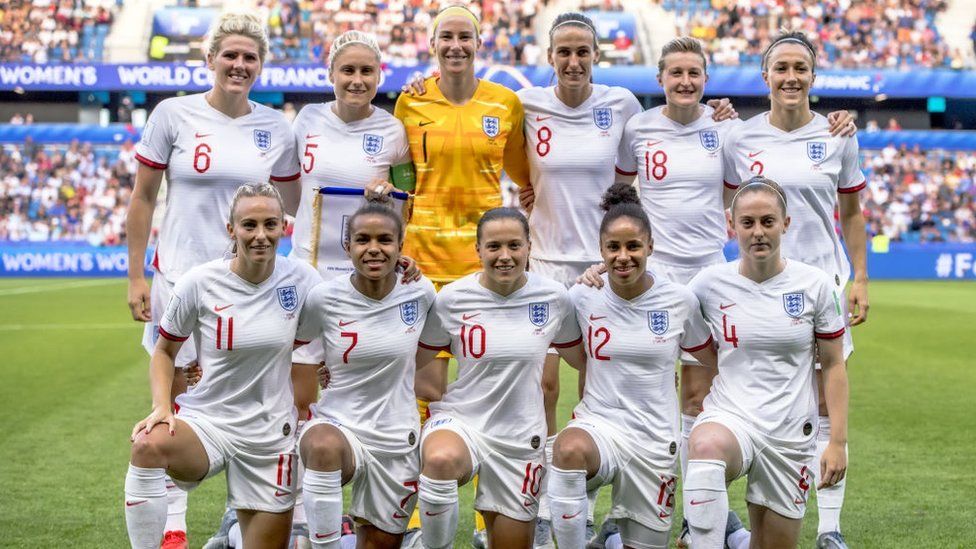Women's World Cup 2019: Mapping England's Lionesses squad
- Published

England's Women's World Cup squad carry the hopes of an entire nation on Tuesday night in their semi-final clash with the USA.
The Lionesses are also a distinctly northern group, with the majority of the 23-strong squad born in north-west or north-east England or Yorkshire.
Not a single player was born in London, the East or the South West of England, with just three born in the South East.
Merseyside has provided four of the players, with defender Alex Greenwood and forwards Toni Duggan and Nikita Parris all born in Liverpool and Jodie Taylor over the river in Birkenhead.
Arguably goalkeeper Karen Bardsley should not be on the map as she was born in Santa Monica, California.
However, she plays for England - and has now done so in three World Cups - thanks to her family ties to Stockport and plays for Manchester City, so she takes the north's tally of players to 16.
Elsewhere in the North West, Keira Walsh is from Rochdale, and Abbie McManus from Prestwich, Bury. Georgia Stanway was born in Barrow-in-Furness.
From the North East, the team's captain Steph Houghton is from Durham, Jill Scott from Sunderland, Demi Stokes from South Shields and Carly Telford from Newcastle.
Right at the top comes Lucy Bronze from Berwick-upon-Tweed.
England boss Phil Neville called the goalscoring right back "the best player in the world, without a shadow of a doubt" after the win over Norway on Thursday but if she had been born just three or four miles further north she could have been playing for Scotland.
The northern dominance of the England squad is also a trait of the men's team, as we illustrated this time last year, but for the Lionesses the ties to Yorkshire are more spread out, instead of concentrated around Sheffield.
Defender Rachel Daly was born in Harrogate while forward Beth Mead is from Whitby and midfielder Lucy Staniforth is from York.
From the East Midlands are Chesterfield-born Millie Bright, Jade Moore from Worksop and Mary Earps from Nottingham.
The only southern-born players are Leah Williamson from Milton Keynes, top-scorer Ellen White from Aylesbury and Fran Kirby from Reading.
Completing the squad - and its longest-serving player - is Karen Carney from Solihull, the only West Midlander in the team.
One reason why the north is so prominent in the squad is there are more football talent centres per head of population in the north than in the south.
Dr Julia West from the School of Sport and Exercise Science at the University of Worcester, said: "There is a higher population density in the south of the country so you might think there should be more elite players from the south.
"However, there are fewer higher tier regional talent clubs so there may be fewer elite pathway spaces proportionately."
Does Aylesbury have love for its Lioness Ellen White?
Jen O'Neill, a former Sunderland player and editor of the women's football website SheKicks.net, said there would be various reasons why so many players come from the north.
"If you are sporty in the north, then you'll probably play football," she said.
"It's in the culture, it's all around and it's the most accessible sport. There's a toughness about northern girls, although it sounds like a stereotype."
Referring to Sunderland, where seven of the World Cup squad have played at some point in their careers, she said: "It's not that the north is better geared up [for women's football] but there are a few clubs that have done a really good job."
She also praised Everton, where Duggan, Parris and Greenwood have all played, as well as clubs such as Leeds and Sheffield.
Tina Hamilton, the chairwoman of Formby Community FC, presented the Women's FA Cup at Wembley in 2018 because of her work in grassroots football in Liverpool.
She said: "We're hardy in the north and we're used to dreadful weather and kids are getting out there in all conditions.
"The north has a real passion for football that runs through families. Football is becoming football, not 'girls' football' and 'boys' football'."
England take on the USA in the semi-final of the 2019 Women's World Cup at 20:00 BST on Tuesday. Full coverage is on BBC1, the BBC Sport website and BBC Sport App.
- Published2 July 2019
- Published28 June 2019
- Published28 June 2019
- Published27 June 2019
- Published25 June 2019
- Published7 June 2019